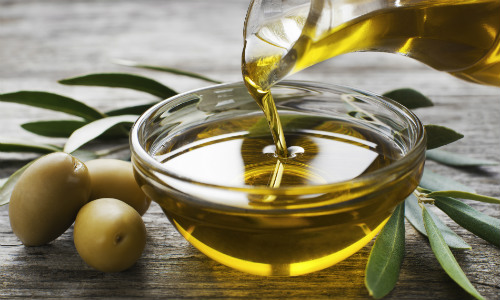Cooking oils | A guide to the healthiest fats
- Overview
- Full article
- Related articles
Food oils sit in the category of ‘fats’, which are a vital part of a healthy diet. The benefits of fats are vast and include,
But we need to choose the right kind of fats to be beneficial. Over the years there's been mixed messages about which fats and oils we should be eating, spreading and cooking. Here I’ll shed some light on the current accepted truths.
Best for cooking at low temperatures
Olive oil, rapeseed oil, avocados, goose, duck and chicken fat are all examples of monounsaturated fats, which are liquid at room temperature but may solidify in the refrigerator.

When they are heated, monounsaturated fats can oxidise, (the term used when one molecule gives up an electron to another) leading to instability and rancidity. So, oven temperature should be no higher than 180 degrees when baking or roasting with monounsaturated fats.
If oil creates smoke when you cook, the beneficial antioxidants within the oils are replaced with free radicals which, over time, may be harmful to our bodies. To prevent olive oil getting too hot while frying, you can ‘steam fry’ by adding a tablespoon of water to the oil and placing a lid on the pan.
Extra virgin olive oil is considered to be the best fat for cooking at low temperatures.
Best for cooking at high temperatures and frying
Butter, lard, tallow and coconut oil are all saturated fats, which are solid at room temperature. The chemical structure of saturated fat has each carbon molecule linked or ‘saturated’ with hydrogen, so when this fat is heated the molecules remain stable. This means they won’t become oxidised or rancid with heat. So saturated fats are the best for cooking at temperatures over 180℃.
Recent research shows that saturated fats are not making the contribution towards heart disease once thought..
Worst for cooking
Polyunsaturated fat, found in nut and seed oils, is liquid at room temperature. These fats, which include the popular sunflower seed oil, have more than one (poly) double bond in their carbon chain, and these carbon bonds are missing their hydrogen atoms.
Because of these multiple ‘unsaturated’ or ‘incomplete’ double bonds, polyunsaturated fats are chemically unstable and prone to oxidation. This makes them the worst oils to cook with, as heat produces damaging free radicals within the oils.
So nut and seed oils, and their margarines, shouldn’t be used in cooking.

Best for baking and spreading
Butter has traditionally been used in baking and this remains one of the best fats to use. But you may like to experiment with using coconut oil in place of butter or half and half with butter in recipes.
Butter and coconut oil are also the best fats to use for spreading. You can make a healthier alternative to margarine by mixing extra virgin olive oil with virgin coconut oil in a ratio of 1:1. Blend thoroughly and place in a refrigerator to firm.
Best for salad dressings
There is lots of research showing that extra virgin olive oil (unrefined and not heat treated) is one of the best fats for health due to the fatty acids and antioxidants it contains. Some of the benefits include a reduced risk of heart disease.
As well as using it to cook at low temperatures it is also great for salad and vegetable dressings.
‘Cold pressed’ seed oils, which have not been extracted with heat, are also good for salad dressings. Cold pressed flax seed oil is particularly beneficial for dressings as this is a good source of omega 3 fatty acids, which support heart and joint health.
“TIP: For a healthy salad dressing mix flax seed oil with mixed herbs and lemon juice.”
Best avoided fats
Trans fats are man-made rather than naturally occurring. They are vegetable based oils, which have been hydrogenated (the chemical addition of hydrogen to oils) to make them become solid at room temperature. These mimic saturated fats in chemical composition but are not identical. The hydrogen atoms are in a different or ‘trans’ position, making them ‘trans’ fats. Being chemically altered, these fats are hard for the body to process.
Research published in the British Medical Journal (BMJ) concluded that “trans fats are associated with ‘all cause mortality’” (the mortality rate from a specified cause for a population) and that alternatives should be used to replace trans fats.
Last updated Monday 25 April 2022
First published on Thursday 26 November 2015
